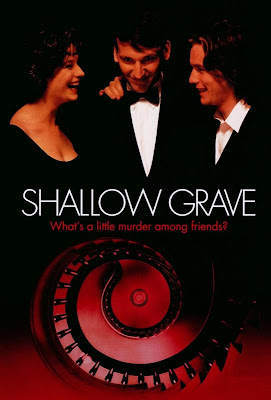
August 21, 2011
New York International Latino Film Festival

August 07, 2011
"Trainspotting," by Danny Boyle

Even if this film is indisputably about heroin, it is also a film about many other subjects. For example, it talks about the fast caducity of the “in” factor and the anxiety provoked by the threat of loosing touch with such reality. In addition, it touches on political subjects. I particularly liked the scene in which the gang of boys follows Tommy into the characteristic Scottish landscape. Here, Renton gives a monologue about what little it means to be Scottish, and his feelings about the British colonization. He provides a concise, yet deep insight into their view of nationalism and their relationship with their own country. Renton yields “Ah’ve never felt British, because ah’m not. It’s ugly and artificial. Ah’ve never really felt Scittish either.” Such a disconnection with society also came through during the scene in which the baby dies. Renton, paralyzed by a sense of impotence, wishes he “could have something to say, something human.” It is as if given their addiction and life style they have become a new kind of animal, something lower than humans.
I particularly like low-budget films because filmmakers are forced to be extremely creativity in order to surpass the roadblocks created by monetary constrains. Trainspotting is a good example of a successful low-budget film. In this case, the financial necessities dominated the creative process from beginning to end: from the writing of the script to its production, finding “new ways of telling new stories [and] speaking of lives that have rarely been spoken of” (27). For this reason, Boyle predominantly shot indoors and the actors selected were not well known. It is also interesting to notice how well they incorporated the lighting sources into the set design. We can see big lights in the floor, covered-up by color filters, as well as red filters covering the windows. However, we never question their presence in the scenes. Additionally, they disregarded the usual use of 3 point lighting, thus, creating unusual shadows in the walls and actors’ faces.
Besides lighting, the monetary restrictions forced very creative solutions out of Hodge when he was writing the script. He knew he should try to keep outdoor scenes to a minimum and thus had to think of inventive solutions to move characters from one location to another, coming up with one of my favorite shots from the film. After Rento’s trial, he walks out of the pub to go to Swanney’s in search of drugs. Hodge explains that he “was thinking, how can I get him there? Are we going to have to see him on the bus or on the street. I thought, no, I can’t be bothered with that. We’ll just have him jumping off the wall” (18) and falling in the floor of the dealer’s house, where the camera was awaiting for him.
After Trainspotting, Boyle said that his team was ready to make movies with a larger budget in order to improve their work. He explains that making low-budget films “is a wonderful discipline to have in the beginning. But as you develop more it’s like being stuck on an escalator that’s moving the wrong way. If you stand still on it you end up going backwards” (30). I haven’t seen A Life Less Ordinary or The Beach, but I’m really curious to see the results of the immediate increase of budget in this team’s creative process since there are numerous directors who lost their essence once immersed in the studio life of Hollywood.
August 05, 2011
"Shallow Grave," by Danny Boyle

In Shallow Grave, we can perceive the determining role that music has in Boyle’s work. In fact, he explains that his “biggest influence is music” (xi). In this film, Boyle uses music to provide hints of an underlying danger which automatically distorts the carefree trait of the characters. When the flatmates are overwhelmed with euphoria from the luggage full of cash, a happy yet unsettling melody overflows the scene. Through the aids of music we realize that there is something off about the situation we are witnessing. Thus, we start speculating about the origins of the money and its real cost. Such use of soundtrack reminded me of the opening scene of David Lynch’s Blue Velvet, in which a happy music is coupled with scenes of a model American suburb. As the camera tracks through these model houses, an unsettling element discreetly takes over the scene.
Shallow Grave explores the power originated from sight. The issue of who is observing and who is been observed was a theme that particularly reminded me of Fritz Lang’s Dr. Mabuse. Surveillance represented power and control over the others, which is why David, the “gentle giant” (10), drilled wholes in the ceiling to observe every inch of the house. Moreover, it is interesting that David needed glasses to be able to see and thus have power over the others. In fact, through close-ups of his glasses, Boyle indicates the shifts of power through the film. By only showing the reflection of the attic’s door in David’s glasses, we know that he will be able to defend himself from the two killers that had just assaulted his flatmates. In addition, when Juliet tries to lure him into running away with her, she starts seducing him by removing his glasses and thus leaving him vulnerable.
In addition to surveillance, Shallow Grave reminded me of Dr. Mabuse regarding the use of technology and telephones as a medium of control and penetration into closed systems. In Dr. Mabuse, the telephone goes from being the glue of his operations to become one of the principal causes of the fall of his empire. Such situation is reenacted in Shallow Grave. When the flatmates are ahead of the game, they have a strong domination over the telephone, deciding to ignore conversations with outsiders. However, the only time when Juliet picks up the phone willing to talk, there is no answer from the other end. Through this call, the two men that were looking for Hugo were able to enter the flat, which was no longer a safe and sealed place.
Back to the Typewriter

